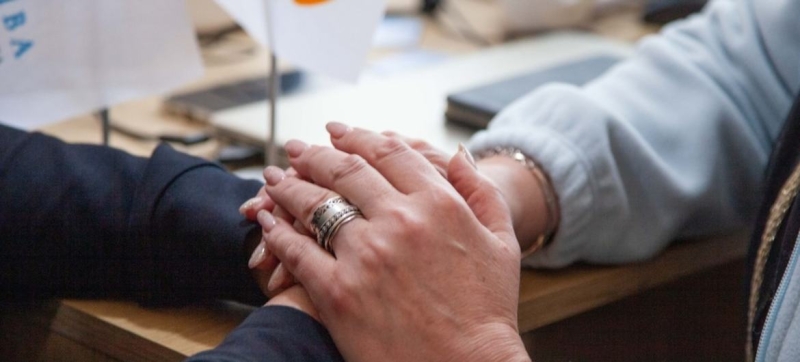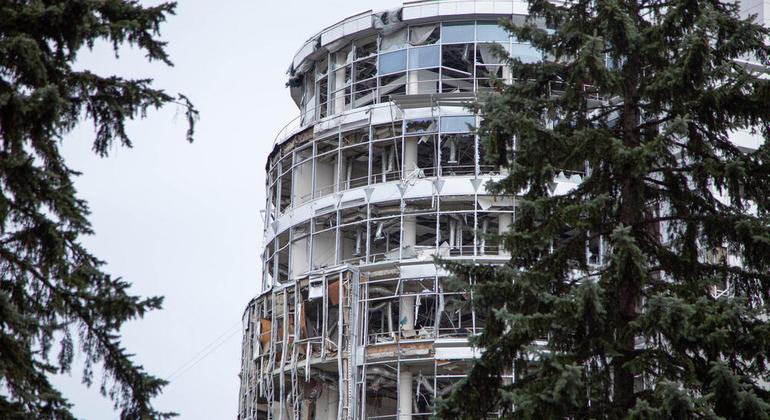
More than 100 teams are deployed across Ukraine to respond to the growing number of cases of gender-based violence. Ukraine: the cost of fighting against gender-based violence on the front lines Women
Call from the police: a case of domestic violence. The mobile team quickly arrives on site. The situation is heating up.
“The man was behaving very aggressively. He threatened to kill the mobile team members, to kill the police, so he was detained. An ambulance was called, but since there were no serious injuries, his wife Ekaterina [name changed – editor’s note] was taken not to the hospital, but to a safe place,” says Elena Kuznetsova, a psychologist from Kharkov.
Elena works as part of a mobile psychosocial support team supported by the United Nations Population Fund (UNFPA). More than 100 teams have been deployed across Ukraine to respond to the growing number of cases of gender-based violence.
This figure has risen sharply since the start of Russia’s full-scale invasion of Ukraine in February 2022. In particular, there have been large numbers of reports of combat-related sexual violence and domestic violence. An estimated 2.5 million people in the country are in need of help, although the actual numbers may be significantly higher.
On the Front Line
In 2015, UNFPA began deploying psychosocial support teams in Ukraine to support women and girls in hard-to-reach areas of Donetsk and Lugansk regions. After the full-scale invasion, the program was expanded to include areas on the front lines so that victims of gender-based violence could receive psychological and physical support and find refuge in safe places.
Over the past two years, mobile teams have had more and more responsibilities, including supporting people during military operations, and the psychological burden has grown. Employees, in particular, are trained on how to cope with anxiety and panic attacks themselves and help others with this.
“When we went to a shelter for victims of domestic violence [in Kharkov ], a nearby factory was hit. We saw smoke. There were screams. The sound of the impact was so loud that the cars stopped with a squeal,” said Kuznetsova.
“We went down to a nearby metro station, which was being used as a bomb shelter. Catherine and her children were shaking, crowds of people were running and screaming everywhere. It was terrible. She started having another panic attack and was having trouble breathing,” she continued.

Kharkov is located very close to the front line, so civilian infrastructure there is severely damaged or completely destroyed. There is an urgent need for food, medicine, power generators and materials to rebuild the city. But local residents, including victims of gender-based violence, also really need psychological support, UNFPA emphasizes.
Psychological assistance to families of veterans
Together with the government of Ukraine, the fund supports the work of hotlines, shelters and crisis centers, which from January to March 2024 alone provided services to more than 190 thousand people in Ukraine. In December 2023, the foundation launched a psychosocial support program for veterans’ families.
Kuznetsova explained that many men returning from combat face undiagnosed mental health problems. “They come back from the war, and they don’t have a period of reintegration. Some have been traumatized and take it out on their families,” the psychologist said.
It is estimated that approximately 30 percent of the Ukrainian population has psychological disorders. Over the past two years, about 9.6 million people have experienced new mental health problems. Because of the war, this number will only increase.
There is a stigma associated with asking for help in society, as it may be perceived as weakness or something necessary only people with serious illnesses.
“There is nowhere to take people”
“Sometimes there is nowhere to take people, not to mention about providing them with psychological or social assistance. It is very dangerous to remain where the strikes took place – the Russian military often strikes the same place twice,” Kuznetsova said. The teams are constantly looking for new safe spaces, she added.
Kharkov residents sometimes also help the psychologists of mobile teams. “Once, when we were working under fire, a woman came to us and said that she had an apartment available if we had people who needed housing,” said Kuznetsova.
UNFPA provided psychosocial services to more than 80,000 people in the region in the first three months of 2024, but people in Ukraine and responders need more support.
“We a strong team and we help each other get back to normal, but frontline workers themselves need psychosocial help. We need this,” says Elena.
Read also:
